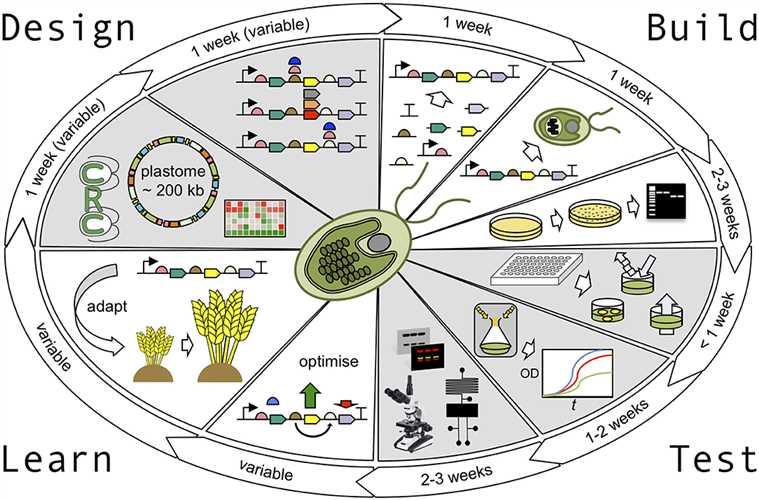Microalgae, as oxygenated phototrophs, lead a frugal lifestyle based on the fixation of atmospheric CO2 by light energy. In addition, when transferred from their natural habitat to controlled conditions, microalgae show higher growth rates suitable for large-scale culture. In algae, chloroplast organelles occupy about two-thirds of the cell space and carry up to 100 copies of plastids. The microalgal chloroplast genome is capable of site-specific recombination between homologous DNA sequences and offers a unique opportunity to overexpress important traits through plastid modification. Since its first demonstration in Chlamydomonas reinhardtii in 1988, genetic tools have been developed that make it possible to produce high-value molecules in different species. However, the commercial application of microalgae as a production platform is hampered by many factors, such as poor biomass, low product yields, and costly downstream processing methods. There is growing interested in the potential of eukaryotic microalgae as an alternative production platform for high-value targets using chloroplast transformation technologies.
 Fig 1. Chlamydomonas plastid testbed. (Jackson H O, et al., 2021)
Fig 1. Chlamydomonas plastid testbed. (Jackson H O, et al., 2021)
The chloroplasts of microalgae are widely popular because they possess a compact and easily processed genome. Microalgal chloroplasts offer unique advantages over the nucleus, such as polyploid conditions, recombination-mediated targeting of exogenous DNA sequences, and the absence of silencing effects. Lifeasible provides specialized microalgal chloroplast genomic services to clients worldwide, by analyzing the genetics and genomes of multiple microalgal species to obtain unique information on chloroplast function and biogenesis. We have successfully developed customized processes for sequencing the chloroplast genomes of microalgae.
(1) Culture of microalgal cells.
(2) Extraction of microalgal chloroplast DNA (cpDNA) and qualitative and quantitative analysis.
(3) Sequencing of microalgal chloroplast genomes and data pre-processing.
(4) Microalgal chloroplast genome assembly and annotation.
(5) Comparative analysis.
Chloroplast genetic transformation of microalgae contributes to the overexpression of desired traits to produce sustainable biofuel feedstocks. Lifeasible also focused on microalgal genetic transformation, establishing plastid-based expression platforms for complex genetic manipulation. Our goal is to improve microalgae based on microalgal chloroplast genetic engineering, including introducing new nitrogen fixation/carbon fixation pathways to increase overall biomass production, enhancement for environmental threats and extreme weather conditions, and integrate of complex polygenic pathways to produce novel bioproducts. We offer customized solutions for the genetic transformation of microalgal chloroplasts.
(1) Algal cell culture and determination of antibiotic susceptibility.
(2) Construction of chloroplast transformation vectors.
(3) Bombardment for genetic transformation.
(4) PCR and Southern blotting to analyze gene and protein expression of interest.
(5) Enable microtitre digital PCR to determine the copy number of the chloroplast genome.
Our solutions provide essential technical support for the broad evolution of organelle genomes and the fine dynamics within microalgae. We can quickly help you obtain multiple microalgae's complete chloroplast genome sequence and improve desired traits based on microalgal chloroplast genetic engineering. If you are interested in our solutions, please contact us directly.
Reference